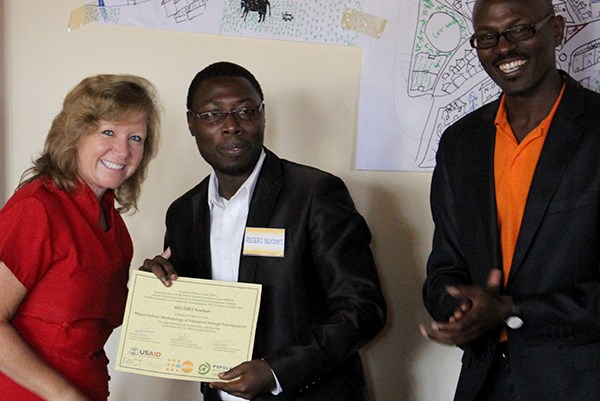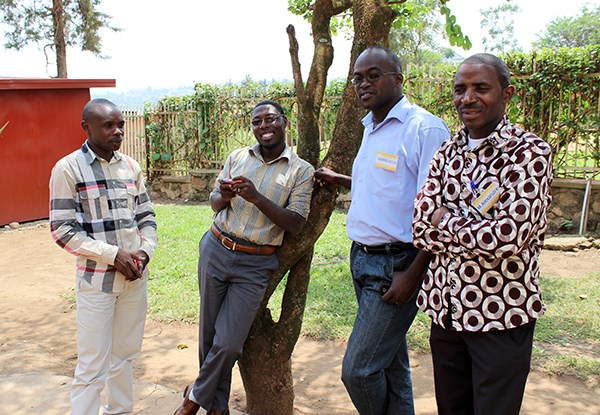SHELBURNE, Vt., March 17, 2014 (GLOBE NEWSWIRE) -- When Norbert Regero was awarded a role in a radio serial drama being produced and aired in his home country of Rwanda, he was ecstatic. Not only was it a job, it was a job in theatre – his first professional role doing a job he loved. Regero didn't yet know that this role would threaten one of his friendships.
Regero was one of the actors chosen to perform in Population Media Center's (PMC) Umurage Urukwiye (Rwanda's Brighter Future) that premiered on April 16, 2007 and ran through July of 2009 and is now being rebroadcast throughout Rwanda.
"Umurage Urukwiye was broadcast three times per week and addressed issues such as reproductive health, family planning, and HIV/AIDS," says PMC's VP of International Programs, Kriss Barker. "It also addressed deforestation and animal habitat preservation, trying to protect habitat for Rwanda's cherished mountain gorillas while improving local farming."
Regero played the character of Cyungo – a young man at University on a scholarship who finds himself failing in his classwork and in trouble with sex and drugs. At his low point, Cyungo earns money by bringing young girls to a wealthy man for exploit. Although Cyungo's story wasn't an exact match, this character's story became problematic for one of Regero's real-life relationships.
"My classmate came to me one day and said 'Did you tell the writer my story?'" Regero says explaining. "He said he could never be my friend because I played his life story and that was a very serious problem for him. I tried to explain that I never spoke of him. I talked to him about how theatre works, how the story was put together, and that I was an actor, not a writer. But it was more than a year before he spoke to me."
PMC's primary work in international development has been to create long-running radio serial dramas, like Umurage Urukwiye, that engage audiences with authentic characters and address relevant social issues. This form of entertainment-education uses the Sabido methodology to create culturally-specific stories with "positive," "negative," and "transitional" characters that model behavior. In this case, Regero's friend saw himself reflected so much in the character that he thought the character was actually modeled on him.
"Many, many young people like the character of Cyungo – how he lives and how he suffers," says Regero discussing Cyungo and what it was like to play the transitional character who evolved over time. "Cyungo was able to change people's minds."
Cyungo was the creation of Alfred Twahirwa, PMC's head writer for Umurage Urukwiye and another Rwanda national. Twahirwa described the excitement for him and the other PMC-Rwanda staff, hearing their work coming to life over the radio.
"We kept thinking, 'Wow, we did it.' And we received so many thanks from people," Twahirwa says. He also describes the phenomenon of people looking for his help to create behavior change in people they knew. "People would send emails and try to find our personal phone numbers trying to convince us to address more issues. They would say, 'Can you please also talk about this? I am sure the person I want to reach will follow it. Can you put emphasis on this?"
Clinic monitoring revealed that more than 57 percent of new clients seeking health services had listened to Umurage Urukwiye. Listeners were also 2.7 times more likely to want to know their HIV status, two times more likely to know about medication mothers can take to prevent transmission of HIV/AIDS to a baby, and 1.5 times more likely to cite population growth as the primary cause of environmental degradation and loss of gorilla habitat.
Umurage Urukwiye was so popular, and the issues continue to be so important, that its 312 episodes are currently being rebroadcast throughout the entire country on Radio Rwanda. Twahirwa and Regero also find themselves back in a PMC-Rwanda office, as PMC gears up to launch a new radio serial drama addressing new issues in Rwanda later this year.
"If someone like Cyungo changes his life," says Regero, "then others can learn how to be better. If you teach someone to change to healthy behavior and improve someone's life, then you can be happy."
ABOUT POPULATION MEDIA CENTER (PMC):
Population Media Center is a nonprofit, international nongovernmental organization, which strives to improve the health and well-being of people around the world through the use of entertainment-education strategies, like serialized dramas on radio and television, in which characters evolve into role models for the audience for positive behavior change. Founded in 1998, PMC has over 15 years of field experience using the Sabido methodology of behavior change communications, impacting more than 50 countries around the world. www.populationmedia.org
Photos accompanying this release are available at:
http://www.globenewswire.com/newsroom/prs/?pkgid=24191
http://www.globenewswire.com/newsroom/prs/?pkgid=24192

